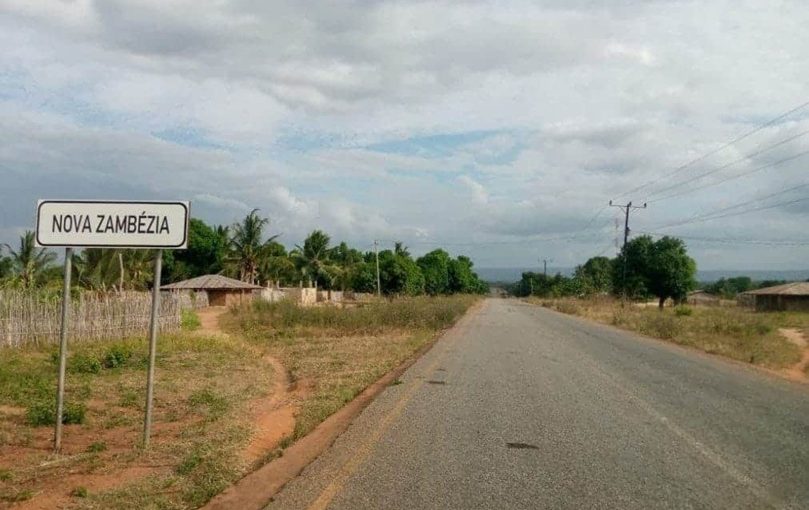Mozambique: Government to boost contribution of logistics to GDP
Mozambique: No attacks in Cabo Delgado road since military escorts re-introduced, business owners ask for two convoys a day

FILE - For illustration purposes only. [File photo: Voz de Cabo Delgado]
Business owners in Cabo Delgado have called on the Mozambican government to double the current security force escorts in Macomia, along the 100-km stretch of the N380 road to Awasse, Mocímboa da Praia, to prevent attacks on transport companies by extremist groups.
Between March and July of this year alone, this section of the N380 recorded 104 attacks on transport companies, with the assailants demanding ransom payments to allow drivers to continue their journey. This led business owners to pressure the government to resume military escorts, the president of the Cabo Delgado business council explained to Lusa tis Friday.
“Since the 23rd [July, when escorts resumed on that section], we have not had any incidents. At least to date, we are happy with the work being done in the field, and this work resulted from dialogue with the government,” Mamudo Irache said.
For a week now, the escort has been operating once a day in each direction, leaving Macomia in the early hours of the morning, ensuring a safe journey of nearly three hours for hundreds of transporters, traders, businesspeople and passengers.
But for Cabo Delgado business owners, more is needed: “We are working with the provincial command to see if the escort will operate twice a day.”
“We are negotiating with the provincial command of the Police of the Republic of Mozambique [PRM] to see if one escort will sleep in Awasse and another in Macomia, to create a crossing point along the way. But this is work being carried out in conjunction with the government; we will probably have the result in the next few days,” explained Irache, who represents the private sector Confederation of Economic Associations (CTA) in Cabo Delgado.
Since the reintroduction of these escorts, which had ended over a year ago, the attacks have stopped, Irache says.
READ: Mozambique: Military escorts re-introduced in Cabo Delgado – AIM
“It’s something we’ve never seen before, it’s happened before, but it’s not like this period (…). They’d take the vehicles, stop them, and then they’d search them. And without paying, they couldn’t get the vehicle out. It was either pay or burn. And one of the ways to avoid losing the vehicle was to ask for help and make the payment,” he recalls.
“Actually, the payment was made immediately. One wouldn’t say I’ll transfer the money tomorrow, no. Made immediately,” he explains, pointing out that some business owners had to transfer 350,000 meticais (€4,800) via digital wallet to avoid losing their vehicles and merchandise, while passengers had to transfer over 10,000 meticais (€135).
“The amounts were transferred. Now, the question they asked us… we were transferring the money. Which account is it? Whose account is it? But since it’s not our responsibility, we let the authorities carry out the investigation. They’re probably doing their job,” he adds.
Currently, Irache says, without a military escort, the recommendation is not to travel on that section of the N380, one of the few paved roads in the region.
“We’ve already warned our transporters, and they’re complying with the orders that they can’t proceed without an escort. Because when an incident happens, we have no way to justify it. If we request an escort, we have to obey it,” he explained, acknowledging that the need for such escorts is currently limited to the section between Macomia and Mocímboa da Praia.
The appeal has already reached the governor of Cabo Delgado province, Valige Tauabo: “Whatever the communities, even our business owners, bring is all valid. We want our people to be well, we want our business owners and traders to carry out their activities in the best, safest way.”
Tauabo recalled that, “for a long time”, the N380 “didn’t require an escort”, and drivers could travel “freely, whenever they wanted”, but fear and attacks have changed the situation in recent weeks.
“Now there’s a request for reinforcements. Reinforcements are welcome […]. It will be evaluated, and within the strategies of the Defence and Security Forces, we will listen. If approved, that’s what we want most. And if it’s not approved, it means there’s another way to carry out the protection work without putting drivers in danger,” the governor added.
Cabo Delgado province, located in the north of the country and rich in gas, has been facing an armed rebellion since 2017, which has caused thousands of deaths and a humanitarian crisis, with over a million people displaced.
The governor acknowledges a resurgence in the activity of these extremist groups in the last three months, more pronounced since the end of June, particularly in the south of the province, which in the last few days alone has caused thousands of people to be displaced, fleeing to Chiúre and neighbouring Nampula province.
Mamudo Irache, a businessman active in the cargo and agricultural transportation industry, with nearly a hundred employees in Cabo Delgado, recalls the impact of the attacks on his business, which caused losses of more than seven million meticais (€95,000) in a 2021 attack: “In Quissanga, I lost two vehicles. One for passenger transport and one for cargo. And the office was burned down. So it’s a feeling of suffering.”
“A huge loss,” says the businessman, who currently owns a fleet of 28 transport vehicles that connect between the provinces of Cabo Delgado, Niassa, Zambézia, and Niassa.












Leave a Reply
Be the First to Comment!
You must be logged in to post a comment.
You must be logged in to post a comment.